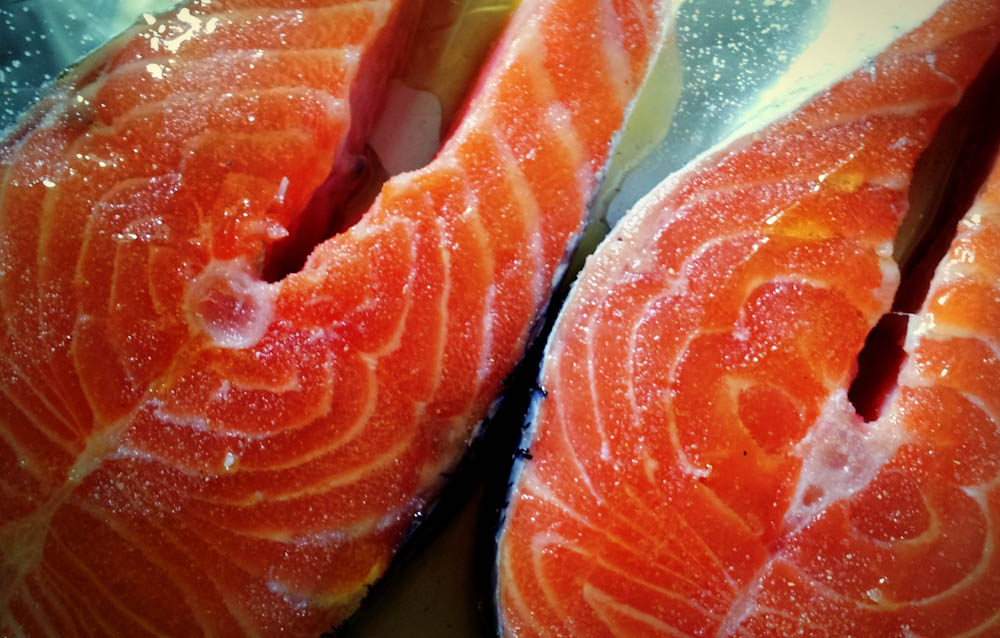
By Stacy Kennedy, MPH, RD, CSO
Do you feel confused, overwhelmed or downright frustrated by the trendy marketing terms used to sell food? You’re not alone! Let’s break down the science, evidence and current recommendations surrounding claims for beef and fish.
The most recent report from the World Health Organization (WHO) says to limit intake of red and processed meats to reduce cancer risk, and the American Institute for Cancer Research (AICR) recommends that adults should consume no more than 18 ounces of red meat per week. The 2015-2020 Dietary Guidelines for Americans calls for more non-meat sources of protein, like nuts, seeds and fish. But beyond the amount and portion size, what about the quality?
Learn more:
There is a preliminary, but growing, body of evidence linking grass-fed beef to an improved nutritional profile, although this doesn’t offset the need to stick with only moderate amounts of red-meat as part of a well balanced, mostly plant-based diet. Specifically, compared to grain-fed beef, grass-fed typically has less overall fat, increased levels of micronutrients like antioxidants, and increased omega-3 fatty acid, which can help prevent muscle loss during cancer treatment. Grass-fed beef also has an improved omega-6:omega-3 fatty acid profile, which may play a role in reducing inflammation. However, further research is needed to determine a correlation between grass-fed beef consumption and the prevention of certain chronic diseases.
Is there a difference between organic and grass-fed beef?
Yes. In fact, there are distinct definitions for these terms, so it’s important to read the fine print carefully. Grass-fed is different from organic.
The USDA sets out organic livestock requirements including:
- “Produced without genetic engineering, ionizing radiation, or sewage sludge.”
- “Managed without antibiotics, added growth hormones, mammalian or avian byproducts, or other prohibited feed ingredients (e.g. urea, manure, or arsenic compounds).
- “Fed 100 percent certified organic feed.” However, this feed does not mean it’s necessarily grass.
The USDA also states that the grass-fed marketing claim, “requires that animals be fed only grass and forage… cannot be fed grain or grain by-products and must have continuous access to pasture during the growing season.”

Should I eat wild-caught, farm-raised, or organic fish?
Experts recommend consuming fish at least twice per week to improve overall health. Some studies show that a plant-based diet that includes some fish may be helpful in reducing risk for colorectal cancers. Fish is an excellent source of protein and contains important immune-supportive nutrients such as selenium and Vitamin D. Fatty fish is also a good source of omega-3 fats.
Fish can be farmed-raised, wild or organic. Farm-raised fish are thought to contain higher levels of contaminants like polychlorinated biphenyls (PCBs), pollutants that can cause health issues when consumed in excessive quantities. Amounts of omega-3 fats in farmed vs. wild fish vary depending on the type of fish. For example, farm raised salmon often contains more healthy omega-3 fats compared to wild salmon, while catfish has far less omega-3 fats when farmed. Learn more about the benefits of eating fish during cancer treatment.
If you choose to eat fish, your best option may be either wild-caught or fish from a sustainable fishery. The term “organic” as it relates to fish is not as meaningful as wild-caught. Organic fish is typically farm-raised and there is inconsistency in the definition and enforcement of the label, “organic,” when it comes to fish. There is also limited information on the benefits or detriments. Organic produce, meat and dairy have much stricter standards and well- defined parameters. Read more on organic fish here.
Quality vs. Quantity
Grass-fed beef and wild-caught fish tend to be pricier than conventional forms of these animal proteins; another reason why quality over quantity can be helpful. By limiting the amount of animal protein you consume, you can consider spending more per ounce since you’ll be eating less. Replacing expensive meats with inexpensive plant-based proteins, like beans, can be a great way to help your wallet, the environment and potentially your health.

Nicely summarized